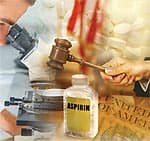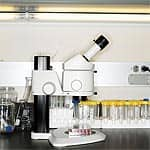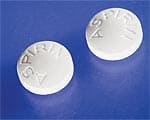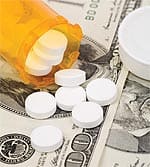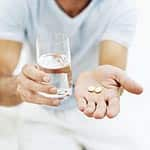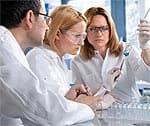Life Extension Magazine®
Three Million Needless Cancer Deaths… Courtesy of the FDAMisguided government actions result in countless numbers of human beings dying needlessly. The FDA exacerbates this tragedy by suppressing the truth about a low-cost drug that Life Extension® has recommended people take since 1983. The report you are about to read documents how daily use of low-dose aspirin could have saved 112,000 Americans from agonizing cancer death each year. Multiply that carnage by the 27 years Life Extension has battled the FDA on the aspirin issue and the total comes to three million unnecessary cancer deaths! Since it is illegal to promote aspirin as a cancer preventive, and the FDA dilutes what can be said about its heart attack-reducing effects, most Americans will not find out what Life Extension members did in the early 1980s, which is to take 81 milligrams of aspirin every day. Imagine you could readily obtain a safe, low-cost drug that could reduce your overall risk of cancer death by 20%. Or slash your risk of colorectal cancer—the third most common cause of cancer mortality in the US for both men and women1—by up to 40%. No pharmaceutical giant could hold a patent on it, and you wouldn’t need a prescription to get it. All you’d have to do to benefit from its anti-cancer power is reach into your own medicine cabinet. In an important scientific development, this unlikely scenario is now a medical reality. After analyzing data drawn from over 25,000 human subjects, a team of researchers at Oxford University has conclusively demonstrated that long-term, low-dose aspirin therapy (75 mg per day) effectively combats multiple forms of cancer—and prevents cancer death.2 In this article, the results of their work are detailed. You will discover the precise mechanisms of action by which aspirin impedes cancer cell development. You will find out how pharmaceutical giants are acting on these findings to reap extraordinary profits at the expense of the public health. You will also learn what you can do to optimize aspirin’s chemopreventive capabilities, naturally minimize its potential side effects—and possibly save your life.
Cardiovascular and Anti-Cancer Research: A Lifesaving LinkAt the forefront of the growing field of research into aspirin’s role as a cancer fighter is Professor Peter Rothwell of Oxford University. Having specialized primarily in cardiovascular medical research, he and his colleagues had at their disposal a trove of information compiled from eight massive studies examining the effect of aspirin therapy on cardiovascular health. Rothwell and his team had previously observed that aspirin treatment for longer than five years appeared to significantly reduce risk for colorectal cancer, one of the most common malignancies in older adults.3,4 On the basis of this insight, they decided to re-examine these eight studies to find out if daily aspirin intake afforded an even greater overall anti-cancer benefit. Their results were published online in December 2010. Cumulatively, these studies provided solid and detailed medical data on nearly 26,000 patients who either took aspirin daily, or took no aspirin, for 5 years or longer. Thanks to meticulous recordkeeping, they were able to determine both the timing and the cause of death for each and every subject under study—including those who had died of cancer. Three of these studies also included follow-up information on subjects over the course of 20 years.2
Among the most compelling of their findings:
The data correlating aspirin therapy with colon cancer prevention proved particularly compelling. Rothwell’s team saw a 24% reduction in the risk of developing colon cancer over a 20-year period in patients who took aspirin daily4 and a 35% reduction in the risk of dying from colon cancer. The most potent preventive benefit was observed in cancers of the upper colon (the ascending and transverse colon).4
Rothwell’s team made two more important discoveries. First, while a minimum 5 years of low-dose aspirin intake is required to enjoy its chemopreventive effect, it may take 10 years or longer after the start of therapy to realize aspirin’s full beneficial potential. In other words, the sooner you start on a daily low-dose aspirin regimen, the better your chances of maximizing aspirin’s cancer-fighting effect.3 Second, their findings indicate that you need to take aspirin every day in order to get the cancer-preventive benefit.2 In one particularly noteworthy controlled trial, a large cohort of more than 19,000 women taking low-dose aspirin (100 mg) only every other day exhibited no protective effect.5 The results of Rothwell’s analysis corroborated existing evidence indicating that regular aspirin intake might protect against a constellation of common cancers. Large epidemiological analyses have shown that people who take daily doses of aspirin enjoy a preventive effect against most types of colorectal cancer,6,7 as much as 40% by consensus estimates.8,9 In people with known adenomatous polyps—small, fleshy, protuberant precursors to malignancy—short-term aspirin therapy reduces the risk of recurrence.3 Separate observational studies have suggested a preventive effect for cancers of the esophagus, stomach, lung, breast, and ovaries.8,10,11 A 2010 study revealed that men taking regular aspirin supplements attained a 10% reduction in prostate cancer risk compared to men who took no aspirin.12 Another study showed a risk reduction of 24% in long-term users (greater than 5 years), and 29% in daily aspirin users.13 Although those studies were encouraging, they were small, and some of their results were conflicting. Furthermore, observational studies can sometimes be inconclusive at determining risks and benefits of medications, because they do not (by definition) include any controls such as a placebo group. So Rothwell and his group made certain that their study design was robust enough to deliver definitive answers to these lingering questions.
“Aspirin-Like” Drugs: Barefaced Big Pharma Profiteering?In response to the release of Professor Rothwell’s recent landmark findings, the highly regarded British newspaper The Guardian reported, “If Big Pharma had unveiled a brand new drug that would stop 20% of cancer deaths, the hype would be enormous and the pressure to buy it, at an inevitably high cost, huge.”32 A prescient observation: it turns out efforts are already underway to exploit Rothwell’s findings in order to reap profits while downplaying aspirin’s anti-cancer efficacy.
Studies of pharmacologically similar compounds, like selective COX-2 inhibitors (the coxibs), are now appearing that demonstrate anti-cancer effects almost identical to those of aspirin itself.23,33-35 The problem? Coxibs are not only much more expensive than aspirin; they’re relatively dangerous. In fact, the coxibs have been linked with an increased risk of adverse cardiovascular events such as heart failure, myocardial infarction (heart attack), and stroke.36-38 Why investigate their anti-cancer efficacy if they’re no better, cheaper, or safer than aspirin? In all likelihood because many coxibs remain under patent protection, and thus represent a potential windfall for the pharmaceutical industry. Newer drugs “based” on aspirin, called nitric oxide-donating aspirins, are also in development, even though they have yet to prove themselves in any way superior to aspirin.39-41 This is yet another instance of a widespread drug company practice: synthetically alter a safe, inexpensive and readily available compound by attaching a molecule to it, thereby creating an entirely “new” patentable drug, one that holds enormous profit-making potential at the expense of the public health. So if you find yourself reading headlines in the near future announcing coxibs’ newfound power to fight cancer, or celebrating a “new kind of cancer-fighting aspirin,” you may safely ignore them. Stick with regular aspirin instead.
SummaryIn a meta-analysis involving over 25,000 human subjects, a team of Oxford researchers has conclusively demonstrated that daily low-dose aspirin therapy slashes overall risk of cancer death by 20% and colorectal cancer death risk by nearly 40%. This cancer-preventive benefit increases with age, proving especially effective in populations 55 and older. It also increases over time, requiring a minimum of 5 years for the chemopreventive benefit to fully manifest, and reaching peak power at 10 years. This means the earlier you start on a low-dose aspirin regimen, the greater your cancer risk reduction. Aspirin combats cancer at the molecular level by beneficially modulating or suppressing the activity of the pro-inflammatory enzyme cyclooxygenase-2 (COX-2) and the “master switch” protein complex nuclear factor-kappaB (NF-kB). Natural interventions to minimize aspirin’s potential side effects are also indicated, including zinc carnosine as polaprezinc and extracts of cranberry and licorice. Meanwhile, drug companies are already attempting to capitalize on these findings by developing pharmacologically similar drugs no more effective than aspirin and far more costly and dangerous, including COX-2 inhibitors (coxibs) and nitric oxide-donating aspirins. If you have any questions on the scientific content of this article, please call a Life Extension® Health Advisor at
|
| References |
| 1. Available at: http://www.cancer.org/cancer/colonandrectumcancer/detailedguide/colorectal-cancer-key-statistics. Accessed February 23, 2011. 2. Rothwell PM, Fowkes FG, Belch JF, Ogawa H, Warlow CP, Meade TW. Effect of daily aspirin on long-term risk of death due to cancer: analysis of individual patient data from randomised trials. Lancet. 2011 Jan 1;377(9759):31-41. Epub 2010 Dec 6. 3. Flossmann E, Rothwell PM. Effect of aspirin on long-term risk of colorectal cancer: consistent evidence from randomised and observational studies. Lancet. 2007 May 12;369(9573):1603-13. 4. Rothwell PM, Wilson M, Elwin CE, et al. Long-term effect of aspirin on colorectal cancer incidence and mortality: 20-year follow-up of five randomised trials. Lancet. 2010 Nov 20;376(9754):1741-50. 5. Cook NR, Lee IM, Gaziano JM, et al. Low-dose aspirin in the primary prevention of cancer: the Women’s Health Study: a randomized controlled trial. JAMA. 2005 Jul 6;294(1):47-55. 6. Jankowska H, Hooper P, Jankowski JA. Aspirin chemoprevention of gastrointestinal cancer in the next decade. A review of the evidence. Pol Arch Med Wewn. 2010 Oct;120(10):407-12. 7. Elwood PC, Gallagher AM, Duthie GG, Mur LA, Morgan G. Aspirin, salicylates, and cancer. Lancet. 2009 Apr 11;373(9671):1301-9. 8. Sjodahl R. Nonsteroidal anti-inflammatory drugs and the gastrointestinal tract. Extent, mode, and dose dependence of anticancer effects. Am J Med. 2001 Jan 8;110(1A):66S-69S. 9. Thun MJ, Henley SJ, Patrono C. Nonsteroidal anti-inflammatory drugs as anticancer agents: mechanistic, pharmacologic, and clinical issues. J Natl Cancer Inst. 2002 Feb 20;94(4):252-66. 10. Corley DA, Kerlikowske K, Verma R, Buffler P. Protective association of aspirin/NSAIDs and esophageal cancer: a systematic review and meta-analysis. Gastroenterology. 2003 Jan;124(1):47-56. 11. Bosetti C, Gallus S, La Vecchia C. Aspirin and cancer risk: a summary review to 2007. Recent Results Cancer Res. 2009;181:231-51. 12. Dhillon PK, Kenfield SA, Stampfer MJ, Giovannucci EL. Long-term aspirin use and the risk of total, high-grade, regionally advanced and lethal prostate cancer in a prospective cohort of health professionals, 1988-2006. Int J Cancer. 2010 Dec 2. 13. Salinas CA, Kwon EM, FitzGerald LM, et al. Use of aspirin and other nonsteroidal antiinflammatory medications in relation to prostate cancer risk. Am J Epidemiol. 2010 Sep 1;172(5):578-90. 14. Pasero G, Marson P. A short history of anti-rheumatic therapy. II. Aspirin. Reumatismo. 2010 Apr-Jun;62(2):148-56. 15. Lafont O. From the willow to aspirin. Rev Hist Pharm (Paris). 2007 Jul;55(354):209-16. 16. Norn S, Permin H, Kruse PR, Kruse E. From willow bark to acetylsalicylic acid. Dan Medicinhist Arbog. 2009;37:79-98. 17. Morgan G. Should aspirin be used to counteract ‘salicylate deficiency’? Pharmacol Toxicol. 2003 Oct;93(4):153-5. 18. Xie WL, Chipman JG, Robertson DL, Erikson RL, Simmons DL. Expression of a mitogen-responsive gene encoding prostaglandin synthase is regulated by mRNA splicing. Proc Natl Acad Sci U S A. 1991 Apr 1;88(7):2692-6. 19. Wang D, DuBois RN. Pro-inflammatory prostaglandins and progression of colorectal cancer. Cancer Lett. 2008 Aug 28;267(2):197-203. 20. Davies G, Martin LA, Sacks N, Dowsett M. Cyclooxygenase-2 (COX-2), aromatase and breast cancer: a possible role for COX-2 inhibitors in breast cancer chemoprevention. Ann Oncol. 2002 May;13(5):669-78. 21. Gately S, Kerbel R. Therapeutic potential of selective cyclooxygenase-2 inhibitors in the management of tumor angiogenesis. Prog Exp Tumor Res. 2003;37:179-92. 22. Arun B, Goss P. The role of COX-2 inhibition in breast cancer treatment and prevention. Semin Oncol. 2004 Apr;31(2 Suppl 7):22-9. 23. Chu AJ, Chou TH, Chen BD. Prevention of colorectal cancer using COX-2 inhibitors: basic science and clinical applications. Front Biosci. 2004 Sep 1;9:2697-713. 24. Sandler AB, Dubinett SM. COX-2 inhibition and lung cancer. Semin Oncol. 2004 Apr;31(2 Suppl 7):45-52. 25. Lee SH, Williams MV, Dubois RN, Blair IA. Cyclooxygenase-2-mediated DNA damage. J Biol Chem. 2005 Aug 5;280(31):28337-46. 26. Gradilone A, Silvestri I, Scarpa S, et al. Failure of apoptosis and activation on NFkappaB by celecoxib and aspirin in lung cancer cell lines. Oncol Rep. 2007 Apr;17(4):823-8. 27. Sclabas GM, Uwagawa T, Schmidt C, et al. Nuclear factor kappa B activation is a potential target for preventing pancreatic carcinoma by aspirin. Cancer. 2005 Jun 15;103(12):2485-90. 28. Zhang Z, Rigas B. NF-kappaB, inflammation and pancreatic carcinogenesis: NF-kappaB as a chemoprevention target (review). Int J Oncol. 2006 Jul;29(1):185-92. 29. Luqman S, Pezzuto JM. NFkappaB: a promising target for natural products in cancer chemoprevention. Phytother Res. 2010 Jul;24(7):949-63. 30. Kutuk O, Basaga H. Aspirin inhibits TNFalpha- and IL-1-induced NF-kappaB activation and sensitizes HeLa cells to apoptosis. Cytokine. 2004 Mar 7;25(5):229-37. 31. Lloyd FP, Jr., Slivova V, Valachovicova T, Sliva D. Aspirin inhibits highly invasive prostate cancer cells. Int J Oncol. 2003 Nov;23(5):1277-83. 32. Available at: http://www.guardian.co.uk/society/sarah-boseley-global-health/2010/dec/07/cancer-cancer. Accessed February 10, 2011. 33. Cooper K, Squires H, Carroll C, et al. Chemoprevention of colorectal cancer: systematic review and economic evaluation. Health Technol Assess. 2010 Jun;14(32):1-206. 34. Grau de Castro JJ. COX-2 inhibitors in cancer prevention. Rev Clin Esp. 2005 Sep;205(9):446-56. 35. Buchanan FG, Holla V, Katkuri S, Matta P, DuBois RN. Targeting cyclooxygenase-2 and the epidermal growth factor receptor for the prevention and treatment of intestinal cancer. Cancer Res. 2007 Oct 1;67(19):9380-8. 36. Grosser T, Yu Y, Fitzgerald GA.Emotion recollected in tranquility: lessons learned from the COX-2 saga. Annu Rev Med. 2010;61:17-33. 37. Ross JS, Madigan D, Hill KP, Egilman DS, Wang Y, Krumholz HM. Pooled analysis of rofecoxib placebo-controlled clinical trial data: lessons for postmarket pharmaceutical safety surveillance. Arch Intern Med. 2009 Nov 23;169(21):1976-85. 38. Vaithianathan R, Hockey PM, Moore TJ, Bates DW. Iatrogenic effects of COX-2 inhibitors in the US population: findings from the Medical Expenditure Panel Survey. Drug Saf. 2009;32(4):335-43. 39. Hua A, Mackenzie GG, Rigas B. The differential cell signaling effects of two positional isomers of the anticancer NO-donating aspirin. Int J Oncol. 2009 Oct;35(4):837-44. 40. MacDonald CJ, Cheng RY, Roberts DD, Wink DA, Yeh GC. Modulation of carcinogen metabolism by nitric oxide-aspirin 2 is associated with suppression of DNA damage and DNA adduct formation. J Biol Chem. 2009 Aug 14;284(33):22099-107. 41. Zhou H, Huang L, Sun Y, Rigas B. Nitric oxide-donating aspirin inhibits the growth of pancreatic cancer cells through redox-dependent signaling. Cancer Lett. 2009 Jan 18;273(2):292-9. 42. Lafrance JP, Miller DR. Selective and non-selective non-steroidal anti-inflammatory drugs and the risk of acute kidney injury. Pharmacoepidemiol Drug Saf. 2009 Oct;18(10):923-31. 43. De Broe ME, Elseviers MM. Over-the-counter analgesic use. J Am Soc Nephrol. 2009 Oct;20(10):2098-103. 44. Kuo HW, Tsai SS, Tiao MM, Liu YC, Lee IM, Yang CY. Analgesic use and the risk for progression of chronic kidney disease. Pharmacoepidemiol Drug Saf. 2010 Jul;19(7):745-51. 45. Yeomans ND. Aspirin: old drug, new uses and challenges*. J Gastroenterol Hepatol. 2010 Nov 10. 46. Zilli M, Iacobelli S. Chemoprophylaxis in gastrointestinal tumors. Eur Rev Med Pharmacol Sci. 2010 Apr;14(4):285-91. 47. Banoob DW, McCloskey WW, Webster W. Risk of gastric injury with enteric- versus nonenteric-coated aspirin. Ann Pharmacother. 2002 Jan;36(1):163-6. 48. Savon JJ, Allen ML, DiMarino AJ Jr, Hermann GA, Krum RP. Gastrointestinal blood loss with low dose (325 mg) plain and enteric-coated aspirin administration. Am J Gastroenterol. 1995 Apr;90(4):581-5. 49. Hiraishi H, Shimada T. Role of proton pump inhibitor in the management of low dose aspirin related ulcerations. Nippon Rinsho. 2010 Nov;68(11):2096-101. 50. Ueki N, Miyake K, Sakamoto C. Prophylaxis and treatment of gastric ulcer by low-dose aspirin in the aged. Nippon Rinsho. 2010 Nov;68(11):2083-8. 51. Cuzick J, Otto F, Baron JA, et al. Aspirin and non-steroidal anti-inflammatory drugs for cancer prevention: an international consensus statement. Lancet Oncol. 2009 May;10(5):501-7. 52. Handa O, Yoshida N, Tanaka Y, et al. Inhibitory effect of polaprezinc on the inflammatory response to Helicobacter pylori. Can J Gastroenterol. 2002 Nov;16(11):785-9. 53. Ishihara R, Iishi H, Sakai N, et al. Polaprezinc attenuates Helicobacter pylori-associated gastritis in Mongolian gerbils. Helicobacter. 2002 Dec;7(6):384-9. 54. Matsukura T, Tanaka H. Applicability of zinc complex of L-carnosine for medical use. Biochemistry (Mosc). 2000 Jul;65(7):817-23. 55. Suzuki H, Mori M, Seto K, et al. Polaprezinc attenuates the Helicobacter pylori-induced gastric mucosal leucocyte activation in Mongolian gerbils—a study using intravital videomicroscopy. Aliment Pharmacol Ther. 2001 May;15(5):715-25. 56. Suzuki H, Mori M, Seto K, et al. Polaprezinc, a gastroprotective agent: attenuation of monochloramine-evoked gastric DNA fragmentation. J Gastroenterol. 1999;34 Suppl 11:43-6. 57. Kresty LA, Howell AB, Baird M. Cranberry proanthocyanidins induce apoptosis and inhibit acid-induced proliferation of human esophageal adenocarcinoma cells. J Agric Food Chem. 2008 Feb 13;56(3):676-80. 58. Lin YT, Kwon YI, Labbe RG, Shetty K. Inhibition of Helicobacter pylori and associated urease by oregano and cranberry phytochemical synergies. Appl Environ Microbiol. 2005 Dec;71(12):8558-64. 59. Zhang L, Ma J, Pan K, Go VL, Chen J, You WC. Efficacy of cranberry juice on Helicobacter pylori infection: a double-blind, randomized placebo-controlled trial. Helicobacter. 2005 Apr;10(2):139-45. 60. Shmuely H, Yahav J, Samra Z, et al. Effect of cranberry juice on eradication of Helicobacter pylori in patients treated with antibiotics and a proton pump inhibitor. Mol Nutr Food Res. 2007 Jun;51(6):746-51. 61. Zafra-Stone S, Yasmin T, Bagchi M, Chatterjee A, Vinson JA, Bagchi D. Berry anthocyanins as novel antioxidants in human health and disease prevention. Mol Nutr Food Res. 2007 Jun;51(6):675-83. 62. Matsushima M, Suzuki T, Masui A, et al. Growth inhibitory action of cranberry on Helicobacter pylori. J Gastroenterol Hepatol. 2008 Dec;23 Suppl 2:S175-80. 63. Kolbe L, Immeyer J, Batzer J, et al. Anti-inflammatory efficacy of Licochalcone A: correlation of clinical potency and in vitro effects. Arch Dermatol Res. 2006 Jun;298(1):23-30. 64. Kwon HS, Oh SM, Kim JK. Glabridin, a functional compound of liquorice, attenuates colonic inflammation in mice with dextran sulphate sodium-induced colitis. Clin Exp Immunol. 2008 Jan;151(1):165-73. 65. Fukai T, Marumo A, Kaitou K, Kanda T, Terada S, Nomura T. Anti-Helicobacter pylori flavonoids from licorice extract. Life Sci. 2002 Aug 9;71(12):1449-63. 66. Krausse R, Bielenberg J, Blaschek W, Ullmann U. In vitro anti-Helicobacter pylori activity of Extractum liquiritiae, glycyrrhizin and its metabolites. J Antimicrob Chemother. 2004 Jul;54(1):243-6. 67. O’Mahony R, Al-Khtheeri H, Weerasekera D, et al. Bactericidal and anti-adhesive properties of culinary and medicinal plants against Helicobacter pylori. World J Gastroenterol. 2005 Dec 21;11(47):7499-507. 68. Lewis HD Jr, Davis JW, Archibald DG, et al. Protective effects of aspirin against acute myocardial infarction and death in men with unstable angina. Results of a Veterans Administration Cooperative Study. N Engl J Med. 1983 Aug 18;309(7):396-403. 69. Gasic GJ, Gasic TB, Murphy S. Anti-metastatic effect of aspirin. Lancet. 1972 Oct 28;2(7783):932-3. 70. Henschke UK, Luande GJ, Choppala JD. Aspirin for reducing cancer metastases? J Natl Med Assoc. 1977 Aug;69(8):581-4. 71. Powles TJ, Dowsett M, Easty GC, Easty DM, Neville AM. Breast-cancer osteolysis, bone metastases, and anti-osteolytic effect of aspirin. Lancet. 1976 Mar 20;1(7960):608-10. 72. Thun MJ, Namboodiri MM, Heath CW Jr. Aspirin use and reduced risk of fatal colon cancer. N Engl J Med. 1991 Dec 5;325(23):1593-6. 73. Rosenberg L, Palmer JR, Zauber AG, Warshauer ME, Stolley PD, Shapiro S. A hypothesis: nonsteroidal anti-inflammatory drugs reduce the incidence of large-bowel cancer. J Natl Cancer Inst. 1991 Mar 6;83(5):355-8. |


